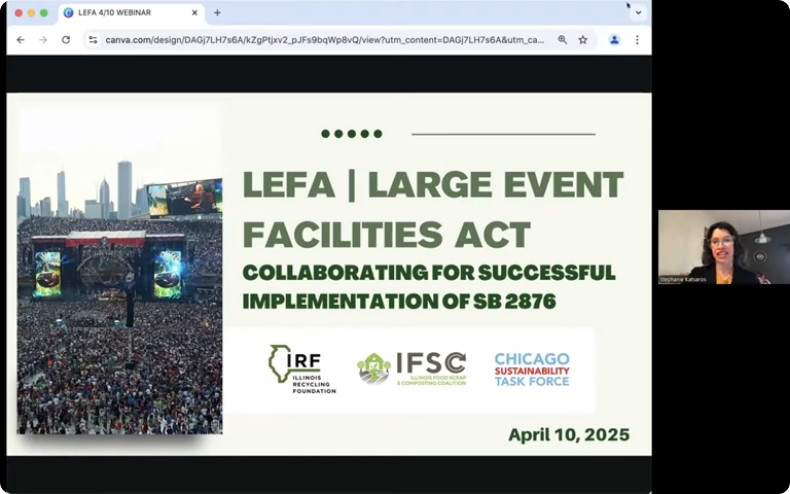
Large Event Facilities Act Implementation Webinar Brings Together Industry Stakeholders
April 10, 2025
📹 Watch the Complete Webinar Recording. Missed the live event? Access the full webinar with all presentations and Q&A sessions
Nearly 150 industry professionals gathered virtually on April 10, 2025 for a comprehensive discussion on implementing Illinois' Large Event Facilities Act (LEFA). The collaborative webinar, hosted by the Illinois Recycling Foundation (IRF), Illinois Foodscrap and Composting Coalition (IFCC), and Chicago Sustainability Task Force (CSTF), provided a forum for venues, food service operators, government agencies, haulers, and composters to discuss the practical aspects of complying with this important legislation.
Background on LEFA
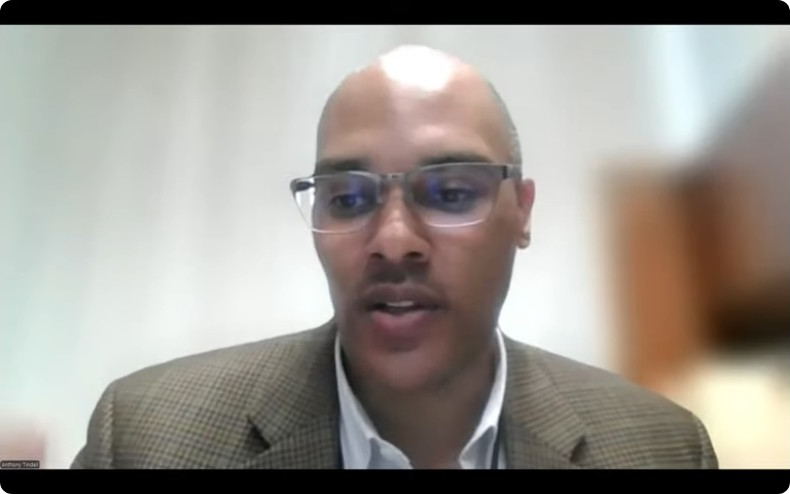
Anthony Tindall, Cook County
The Large Event Facilities Act (SB 2876), which became effective January 1, 2025, requires Illinois venues with a capacity of 3,500 or more to implement recycling and composting programs. The legislation impacts approximately 90 venues statewide, with half located within Cook County and half distributed throughout the rest of Illinois. Stephanie Katsaros of Bright Beat, who moderated the webinar, emphasized that while the legislation may present implementation challenges, it ultimately strengthens the overall food and waste system infrastructure in Illinois. "This goes beyond the venues. It really is an infrastructure conversation and a state conversation," noted Katsaros.
Cook County's Implementation Approach
Anthony Tindall, Solid Waste Coordinator for Cook County's Department of Environment and Sustainability, outlined the county's proposed approach to implementing LEFA in suburban Cook County. Cook County is working on a draft ordinance that includes a phased implementation starting with back-of-house operations (kitchens, food preparation areas, employee break rooms) beginning tentatively June 1, 2025; front-of-house implementation to follow a year later; quarterly reporting requirements; and requirements that materials be diverted to properly permitted recycling facilities, composting facilities, anaerobic digesters, or food donation centers.
"Our approach is not to be heavy-handed when this rolls out. We really want to work with event facilities and provide them the support, technical resources, and assistance that they need in order to fully comply with this law."
Tindall emphasized that Cook County aims to work collaboratively with venues rather than taking a heavy-handed enforcement approach. Cook County is developing a resource guide, enforcement inspection checklist, and dedicated webpage, and has updated its Business Reducing Environmental Pollution (BRITE) program to include free facility assessments for impacted venues.
Real-World Examples from Venues and Haulers
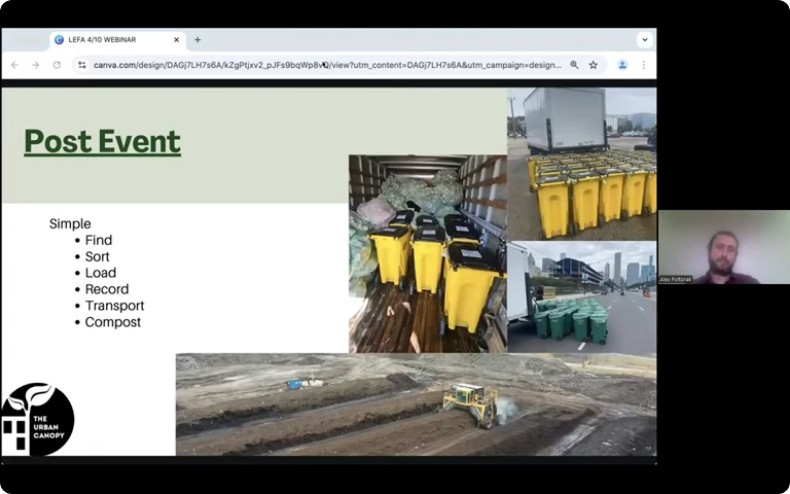
Venue staff managing waste sorting during a major event
Dylan Blanchard, Venue Sustainability Manager at Huntington Bank Pavilion at Northerly Island (a Live Nation venue), shared insights on their sustainability operations. The venue, which has a capacity between 9,200 and 30,000 depending on configuration, employs a hands-on approach to waste sorting. "We have teams who will put gloves on and pick through every bag to pull out everything that they can recycle, compost, or donate to minimize what goes into landfills," explained Blanchard. He emphasized the importance of procurement planning, clear signage, and appropriate waste bin placement throughout the venue.
Alex Poltorak, CEO of Urban Canopy, provided a hauler's perspective on managing waste for various large venues and events, including the Democratic National Convention, Gordon Food Service Expo, Navy Pier, Wrigley Field, and the Chicago Marathon. Poltorak emphasized the importance of pre-event planning, including coordinating product procurement to ensure materials are recyclable or compostable, color-coding waste streams, strategic placement of collection containers, and staff training and deployment. Both presenters highlighted that successful programs involve creating a culture of sustainability throughout the organization, from leadership to hourly staff.
Tools and Resources
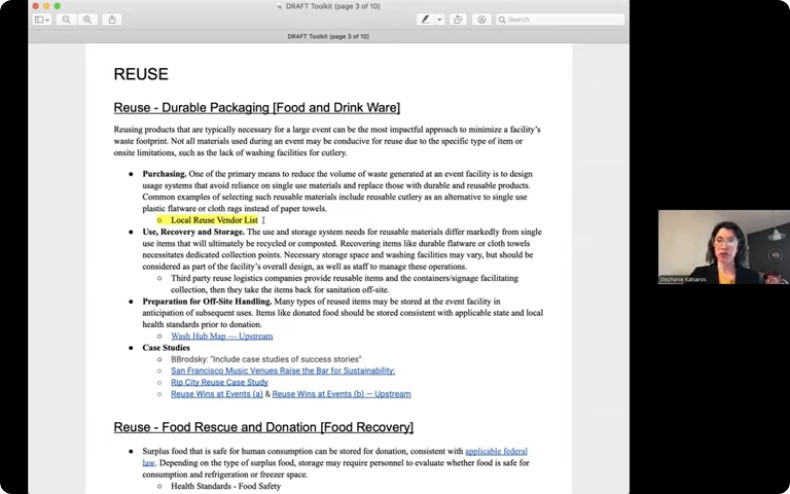
The LEFA toolkit provides comprehensive resources for venue operators
The webinar introduced attendees to the evolving LEFA toolkit, a collaborative document that provides resources and best practices for venues implementing recycling and composting programs. The toolkit includes legal requirements and guidelines, information on reuse infrastructure, food recovery guidelines and local infrastructure, recycling best practices, composting program implementation resources, and contamination mitigation guidelines. Eli from the Illinois EPA Environmental Education team emphasized that the toolkit is a "first step document" that will evolve with input from stakeholders and lead to more localized, contextual guidance.
Industry Collaboration
Clair Ryan, IRF Board President, emphasized the importance of local connections in successful implementation: "I think where the rubber really hits the road is figuring out how to make things work locally with the resources available. I hope every venue can view their county's recycling coordinator as a resource there." The webinar underscored the importance of industry collaboration in successfully implementing LEFA.
"Without the proper infrastructure in place, if employees and staff and customers start to support what you're doing, but the infrastructure is not available, things end up not being recycled or not being composted because of the lack of infrastructure, it will critically destroy the momentum."
Justin Zellner, president of the Wave Foundation and a pioneer in sustainability at sports venues, emphasized the importance of getting the infrastructure and cultural adoption right.
Next Steps
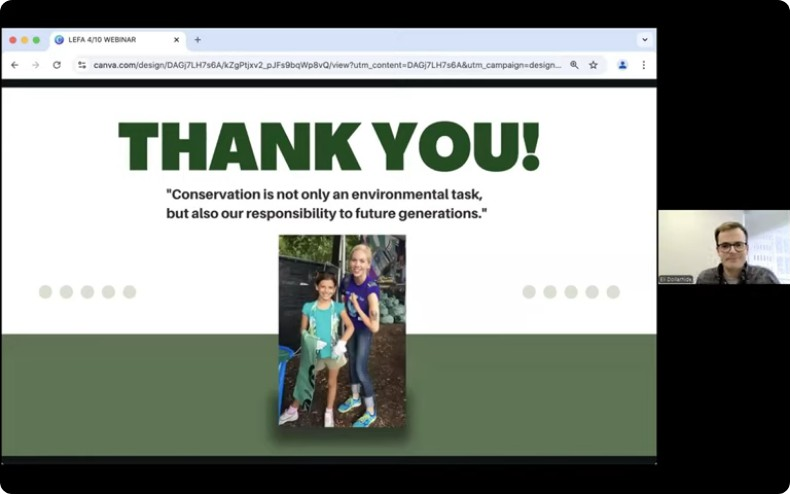
Join us at the upcoming Illinois Circularity Conference in October 2025
Webinar organizers encouraged attendees to provide feedback on what additional resources are needed and to contribute their own success stories and case studies to the toolkit. All registrants will receive links to the toolkit, a form to share information, and a recording of the webinar. The Illinois Recycling Foundation also invited attendees to join the upcoming Illinois Circularity Conference on October 14-15, 2025, in East Peoria, where LEFA implementation will be a featured topic.
The webinar was sponsored by BradleyWorks Sustainable Culinary, SmartSort, and Waste Not Compost.
Join the Illinois Recycling Foundation Today
Become a member to stay informed about recycling initiatives and sustainability efforts across Illinois.
Learn More About MembershipFor more information about IRF and to become a member, visit IllinoisRecycles.org.